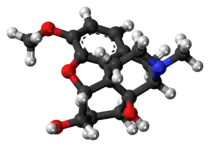 | |
 | |
| Identifiers | |
|---|---|
| |
| CAS Number | |
| PubChem CID | |
| ChemSpider | |
| UNII | |
| CompTox Dashboard (EPA) | |
| ECHA InfoCard | 100.208.390 |
| Chemical and physical data | |
| Formula | C18H23NO4 |
| Molar mass | 317.385 g·mol−1 |
| 3D model (JSmol) | |
| |
| |
| | |
14-Hydroxydihydrocodeine (RAM-318) is an opiate analgesic drug, which is also an active metabolite of oxycodone and hydromorphinol.[1][2] 14-Hydroxydihydrocodeine is not currently marketed in any developed country, but has been of interest to pharmaceutical companies looking for new analgesics and antitussives.
References
- ↑ Ginsburg D (1959). "Some recent advances in the chemistry of the opium alkaloids". UNODC Bulletin on Narcotics (3).
- ↑ Ishida T, Oguri K, Yoshimura H (1979). "Isolation and identification of urinary metabolites of oxycodone in rabbits". Drug Metabolism and Disposition. 7 (3): 162–5. PMID 38087.
This article is issued from Wikipedia. The text is licensed under Creative Commons - Attribution - Sharealike. Additional terms may apply for the media files.